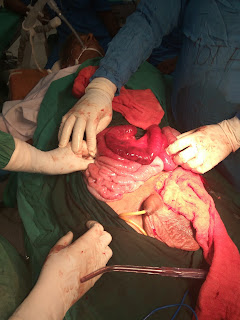VAGAL NERVE FREEZING WILL KILL HUNGER AND REDUCE OBESITY
Prof .DRRAM,HIV /AIDS,HEPATITIS ,SEX DISEASES & WEAKNESS expert,New Delhi,India, profdrram@gmail.com,+917838059592,+919832025033,ON WHATSAPP
A lot of surgical procedure as Bariatric surgery or gastric ballon and banding is being tried to reduce obesity but in this regard one new study reveals that Freezing or dumping of Posterior Vagal Trunk behind Oesophagus will reduce appetite and hunger andthus reducing overweight .
 The study led by the Society of Interventional Radiology said that the treatment proved to be safe and feasible in the initial pilot phase."We developed this treatment for patients with mild-to-moderate obesity to reduce the attrition that is common with weight-loss efforts," said David Prologo, lead author of the study. "We are trying to help people succeed with their own attempts to lose weight."
The study led by the Society of Interventional Radiology said that the treatment proved to be safe and feasible in the initial pilot phase."We developed this treatment for patients with mild-to-moderate obesity to reduce the attrition that is common with weight-loss efforts," said David Prologo, lead author of the study. "We are trying to help people succeed with their own attempts to lose weight."
The procedure involves the insertion of a needle by an interventional radiologist through the patient's back. Then, with the guidance of live images from a CT scan, the radiologist uses argon gas to freeze the nerve, known as the posterior vagal trunk.This nerve, located at the base of the esophagus, is one of several mechanisms that tell the brain that the stomach is empty.
In the study, 10 subjects with a Body Mass Index (BMI) between 30 and 37 underwent the procedure and were followed for 90 days. All subjects reported decreased appetite and the overall average weight loss was 3.6 percent of initial body weight and an average decline of nearly 14 percent of the excess BMI.
No procedure-related complications were reported, and there were no adverse events during the follow-up."Medical literature shows the vast majority of weight-loss programs fail, especially when people attempt to reduce their food intake," said Prologo. "When our stomachs are empty, the body senses this and switches to food-seeking survival mode. We're not trying to eliminate this biological response, only reduce the strength of this signal to the brain to provide a new, sustainable solution to the difficult problem of treating mild obesity."
Following the success of this preliminary safety and feasibility study, more patients are being recruited for a larger clinical trial of the procedure to test the efficacy and durability of the procedure.In presenting the study, the authors noted several limitations, including the small sample size and the interim nature of the results.
The findings from the study are presented at the Society of Interventional Radiology's 2018 Annual Scientific Meeting.Society of Interventional Radiology, freezing, nerve, hunger signals, brain, obesity, lose weight, Annual Scientific Meeting, Body Mass Index (BMI)
- Kidney stones universally present hazard in north india,dillution by water prevent it
- Steroid and placebo effect equally for mild persisting asthma with low sputum eosinophils
- Government wants to fix public healthcare staff shortages with ayush docs: will it work?
- Plea in hc for payment of salaries of edmc, north mcd teachers and doctors
- 7 indian pharma companies named in us lawsuit over inflating generic drug prices
- Woman in up dies after explosion in her mouth during treatment,what is diagnosis?
- Woman in up dies after explosion in her mouth during treatment,what is diagnosis?
- Woman in up dies after explosion in her mouth during treatment,what is diagnosis?
- Air pollution ! mothers organising rally in london,anaesthetist choosing gas,will india follow?
- Cardiac arrest is always not sudden as understood -a study

 Comments (
Comments ( Category (
Category ( Views (
Views (